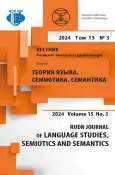Репрезентация метафоры «БУДУЩИЕ СОБЫТИЯ - ВПЕРЕДИ» в немецкой политической карикатуре
- Авторы: Денисова Г.Л.1
-
Учреждения:
- Тольяттинский государственный университет
- Выпуск: Том 15, № 3 (2024)
- Страницы: 646-663
- Раздел: ДИСКУРСИВНАЯ ЛИНГВИСТИКА
- URL: https://journal-vniispk.ru/2313-2299/article/view/323578
- DOI: https://doi.org/10.22363/2313-2299-2024-15-3-646-663
- EDN: https://elibrary.ru/HLWLMZ
- ID: 323578
Цитировать
Полный текст
Аннотация
Автором ставится задача наблюдения актуализации метафоры «БУДУЩИЕ СОБЫТИЯ - ВПЕРЕДИ» в немецкой политической карикатуре как поликодовом тексте. Выясняется, что изображаемые ситуации и образы, которые используются с целью актуализации метафоры, тяготеют к трем центрам ассоциативного поля концепта WEG: перемещение по земле, воде и воздуху. Актуализация метафоры осуществляется меной таксономического класса участника ситуации перемещения в пространстве - субъекта движения, конечной точки / маршрута и каузатора движения. В результате мены осуществляется транспозиция изображаемой ситуации из области пространственных в область темпоральных отношений. Анализ карикатур выявил признаки транспозиции, которые позволяют адресату карикатуры верно декодировать сообщение. Признаками транспозиции являются (1) мена субъекта движения: изображение социального целого как одного лица; представление абстрактного понятия как живого существа; представление социального целого в образе транспортного средства; (2) мена конечной точки или маршрута движения: определение события как цели движения; определение маршрута движения именем политического лидера; (3) спецификация или мена каузатора движения: изображение политического лидера за штурвалом самолета или корабля; наложение на изображение транспортного средства или маяка образа политического лидера. В статье отмечается, что рассматриваемая метафора образует основу темпоральной структуры сообщения и принимает участие в формировании модальности сообщения через детализацию используемого образа.
Ключевые слова
Об авторах
Галина Леонидовна Денисова
Тольяттинский государственный университет
Автор, ответственный за переписку.
Email: g.denisova@tltsu.ru
ORCID iD: 0000-0002-4238-7587
SPIN-код: 9732-9593
доктор филологических наук, доцент, профессор кафедры теории и методики преподавания иностранных языков и культур
445020, Российская Федерация, Тольятти, ул. Белорусская, 14Список литературы
- Novospasskaya, N.V. & Zou, Huajing. (2021). The Formation of Polycode Text Theory. RUDN Journal of Language Studies, Semiotics and Semantics, 12(2), 501–513. https://doi. org/10.22363/2313-2299-2021-12-2-501-513
- Denisova, G.L. (2020). Appeal of the Great Patriotic War cartoons to the Russian language personality. Issues of Cognitive Linguistics 1, 78–86. https://doi.org/10.20916/1812-32282020-1-78-86 (In Russ.).
- Karaulov, Yu.N. (2010). The Russian Language and Language Personality. Moscow: LKI Publ. (In Russ.).
- Ufimtseva, N.V. & Balyasnikova, O.V. (2021) National Identity and the Associative-Verbal Network: on a Hypothesis of Yu.N. Karaulov. RUDN Journal of Language Studies, Semiotics and Semantics, 12(2), 238–254. https://doi.org/10.22363/2313-2299-2021-12-2-238-254 (In Russ.).
- Ryabtseva, N.K. (2005). Language and natural intelligence. Moscow: Academia. (In Russ.).
- Nagy, W. (1974). Figurative Patterns and Redundancy in the Lexicon [dissertation]. San Diego: University of California.
- Lakoff, G. & Mark, J. (2004). Metaphors We Live By. Moscow: Editorial URSS. (In Russ.).
- Agricola, E. (1979). Wörter und Wendungen. Leipzig: Bibliograph. Institut. (In Germ.).
- Klappenbach, R. & Steinitz, W. (1981–1985). Wörterbuch der deutschen Gegenwartssprache: in 6 Bänden. Berlin: Akademie. (In Germ.).
- Binowitsch, L.T. & Grischin, N.N. (1975). Deutsch-russisches phraseologisches Wörterbuch. Мoskau: Russische Sprache. (In Germ.).
- Kempcke, G. (1984). Handwörterbuch der deutschen Gegenwartssprache: in zwei Bänden. Berlin: Akademie. (In Germ.).
- Paducheva, E.V. (2004). Dynamic Models in Lexical Semantics. Moscow: Yazyki slavyanskoi kul’tury. (In Russ.).
- Makovskii, M.M. (2004). Etymological Dictionary of Modern German. Moscow: Azbukovnik.
- Tadzhibova, A.N. & Bykova, L.V. (2018). The Road as a Sphere-source of Metaphorical Expansion in the Coverage of Political Events in the German Press. Litera, 3, 238–248. https:// doi.org10.25136/2409-8698.2018.3.26676 (In Russ.).
- Medyakov, A.S. (2018). From peasant to archangel: The image of the German Michael during the First World War. Dialogue with Time. Intellectual History Review, 63, 146–166. (In Russ.).
- Denisova, G.L. (2018). The Time Category in a Political Cartoon. World of Linguistics and Communication: electronic scientific journal, 3(53), 51–69. https://doi.org0421200038/XXXX (In Russ.).
- Kerimov, R.D. (2015). Metaphorical anthropomorphism in social-political communication. Kemerovo: Kemerovskii gosudarstvennyi universitet. (In Russ.).
- Stepanova, M.D. & Fleischer, W. (1984) Theoretical foundations of word formation in German. Moscow: Vysshaya shkola. (In Russ.).
- Schäfer, E. (1972). Das Staatsschiff: Zur Präzision eines Topos. In: Toposforschung: Eine Dokumentation. Frankfurt am Main: Athenäum. pp. 259–292. (In Germ.)
- Müller K. (1994). Lexikon der Redensarten. München: Lexikographisches Institut; Gütersloch: Bettelsmann Lexikon Verlag. (In Germ.).
Дополнительные файлы









